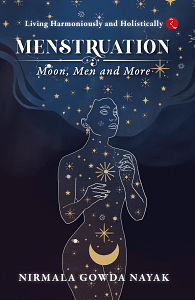Today’s women are a formidable force, adept at multitasking as they manage households, pursue careers and navigate various responsibilities. While their endeavours and priorities differ, self-care remains paramount. Neglecting self-care can lead to stress, impacting both menstrual and mental health. Chronic neglect can disrupt hormonal balance and lead to nutrient deficiencies, resulting in issues like painful cramps, excessive bleeding and even serious illnesses like cancer and type 2 diabetes.
There is no doubt that women are capable of achieving incredible success in diverse roles, whether as entrepreneurs, astronauts, educators, CEOs, volunteers or homemakers. However, it is essential to acknowledge that constant striving for the title of ‘superwoman’ can have detrimental effects on menstrual health. Women must prioritize self-care and follow a carefully structured routine of eating, sleeping, resting and working. This approach ensures that they maintain their physical and mental well-being, allowing them to thrive in their various roles without sacrificing their health.
Ultimately, it’s crucial for women to recognize that their health, including menstrual health, is a priority that cannot be compromised. By prioritizing self-care, women can prevent hormonal imbalances, nutrient deficiencies and associated health concerns, and can continue to excel in their endeavours but also uphold optimal menstrual health and overall well-being.
Focus on yourself
Awareness: Early identification is key to addressing many health concerns. Monitoring bodily changes, understanding family history and recognizing lifestyle pressures can help us identify and treat disorders in their initial stages.
Physical exercise: Engaging in any form of movement is beneficial for both mind and body, whether through dedicated yoga practices, Pilates, mindful walking, swimming, cycling, participation in sports or regularly attending to daily chores. The World Health Organization (WHO) recommends 150 minutes of moderate to vigorous activity every week for adults aged 18–64 years. While a regular fitness routine improves sleep quality, in contrast, excessive or faulty exercising can have negative consequences on our well-being.
Sleep: Adequate sleep is essential for rejuvenation and optimal functioning. In our fast-paced world, neglecting proper sleep deprives our bodies of their habitual repair and regeneration, thereby increasing cortisol levels (stress hormones). Establishing a regular sleep routine, aiming for 6–8 hours of deep sleep, supports overall health and disease prevention. Sleep variations can also occur based on individual doshas and hormonal fluctuations.
Food: Nutrition plays a fundamental role in maintaining health. Fresh, natural, organic and home-cooked foods are essential for optimal well-being. Nutrients present in whole grains, nuts, healthy fats and fruits and vegetables, with most of them having a limited shelf life as nature intended, are most beneficial for us. Food preserved in the refrigerator and reheated can satisfy only the taste buds but often lacks essential nutrients.
Despite mindful eating based on the needs of our cycles, we may still be deprived of essential nutrients, which may be due to adulterated, genetically modified, pesticide-laden food or wrong pairings that may go against our body’s constitution. Stress eating or not eating on time are some of the factors that have proved to be counterproductive. The foods we consume greatly impact our gut health and the quality of our sleep.
Macro and micronutrients: Macro and micronutrients are essential components of all foods, providing the body with the necessary elements for optimal functioning. Macronutrients are fats, carbohydrates and proteins required by the body in large quantities, while micronutrients such as vitamins and minerals are commonly found in fibre-rich fruits and vegetables and are required in smaller proportions (<100 mg/day). Both these vital nutrients are found in a variety of food items, play a critical role in maintaining health and are identified as Vitamins A, B, C, D, E and K; as well as calcium; magnesium; potassium; iron; zinc; and selenium. Water is also an essential micronutrient.
Supplements: Experts opine that modern food is inadequate in providing essential nutrients due to factors like depleted soil, pesticide use and nutrient loss during preservation and transportation. These deficiencies become the culprits for underlying health conditions in the long run, resulting in researchers advocating the use of natural plant-derived supplements to replenish our bodies with the missing nutrients. However, it is crucial to use these supplements under medical guidance to ensure safety and efficacy in boosting energy, immunity and bone health and preventing chronic ailments.
Natural, herbal and Ayurvedic supplements can be beneficial to women and can address almost all issues. However, it is important to ensure they are ethically sourced and of high quality. Factors such as expiration date, manufacturing practices and product authenticity should be considered when choosing supplements. Consulting with a qualified healthcare professional or nutritionist can help individuals make informed decisions about supplement use to support overall health and well-being.
Also Read: Shreya Ghoshal, Sunidhi Chauhan making a taboo topic fun for kids in new Whisper period song
The essentials
‘Be good to yourself. If you don’t take care
of your body, where will you live?’
—KOBI YAMADA
Our ancestors consumed naturally grown local food, fruits and vegetables without chemical or pesticide treatments. Food was grown seasonally and had all the essential nutrients for sustenance. In the past, people relied on freshly ground oil, flour and spices to preserve the antioxidants and enzymes present in their food. However, in light of current circumstances, it is crucial to comprehend what we might be overlooking.
It is common knowledge that vitamins and minerals serve distinct purposes, and each person may derive varying benefits from different types of supplements. As a result, many women today require supplements tailored to their specific needs and deficiencies. Apart from dietary preferences such as vegetarian, vegan, eggetarian or non-vegetarian, it is essential to be mindful of one’s age and take note of any underlying health concerns, long-term medication or allergies. Hence, self-medicating can prove to be counterproductive.
Women should take the initiative to educate themselves about their anatomy and recognize the importance of incorporating natural plant-based supplements into their routines. These supplements play a crucial role in maintaining menstrual regularity and providing support during pregnancy, childbirth and menopause. However, it is imperative that we also identify the potential benefits and drawbacks of specific supplement varieties. In her book What You Must Know About Vitamins, Minerals, Herbs & More, Pamela Wartian Smith, MD, MPH, delves into strategies for maintaining health and reversing diseases by harnessing the power of nutrients. Micronutrients are vital for the body to resist infections, stabilize the nervous system and aid in healing and restoringthe body. Sometimes the required amount of micronutrients cannot be obtained from a regular diet.
This shortfall may stem from a weakened gut incapable of absorbing sufficient nutrients from food or from the poor quality of available food resources or perhaps a combination of both factors. Regardless, replenishing the body with supplements has become the need of the hour and we must educate ourselves on its proper usage.
The demand for supplements has led to a multitude of companies flooding the market with Ayurvedic/herbal or super green supplements, each coming in different combinations and formulae, with recommended dosages, and promising to help restore lost nutrients.
 This excerpt from ‘Menstruation: Moon, Men and More’ by Nirmala Gowda Nayak has been published with permission from Rupa Publications.
This excerpt from ‘Menstruation: Moon, Men and More’ by Nirmala Gowda Nayak has been published with permission from Rupa Publications.






